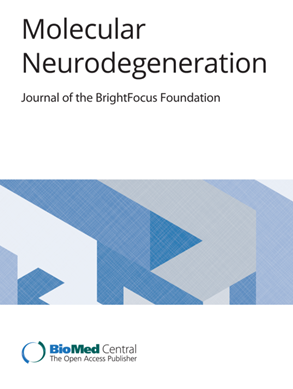Nuclear-import receptors as gatekeepers of pathological phase transitions in ALS/FTD
IF 14.9
1区 医学
Q1 NEUROSCIENCES
引用次数: 0
Abstract
Amyotrophic lateral sclerosis (ALS) and frontotemporal dementia (FTD) are fatal neurodegenerative disorders on a disease spectrum that are characterized by the cytoplasmic mislocalization and aberrant phase transitions of prion-like RNA-binding proteins (RBPs). The common accumulation of TAR DNA-binding protein-43 (TDP-43), fused in sarcoma (FUS), and other nuclear RBPs in detergent-insoluble aggregates in the cytoplasm of degenerating neurons in ALS/FTD is connected to nuclear pore dysfunction and other defects in the nucleocytoplasmic transport machinery. Recent advances suggest that beyond their canonical role in the nuclear import of protein cargoes, nuclear-import receptors (NIRs) can prevent and reverse aberrant phase transitions of TDP-43, FUS, and related prion-like RBPs and restore their nuclear localization and function. Here, we showcase the NIR family and how they recognize cargo, drive nuclear import, and chaperone prion-like RBPs linked to ALS/FTD. We also discuss the promise of enhancing NIR levels and developing potentiated NIR variants as therapeutic strategies for ALS/FTD and related neurodegenerative proteinopathies.核输入受体是 ALS/FTD 病理相变的看门人
肌萎缩侧索硬化症(ALS)和额颞叶痴呆症(FTD)是一种致命的神经退行性疾病,以朊病毒样 RNA 结合蛋白(RBPs)的胞质错定位和异常相变为特征。在 ALS/FTD 中,TAR DNA 结合蛋白-43(TDP-43)、肉瘤融合蛋白(FUS)和其他核 RBPs 在变性神经元的细胞质中以去污剂不溶性聚集体的形式普遍积聚,这与核孔功能障碍和核细胞质转运机制的其他缺陷有关。最近的研究进展表明,核导入受体(NIR)除了在蛋白质货物的核导入中发挥典型作用外,还能防止和逆转 TDP-43、FUS 和相关朊病毒样 RBPs 的异常相变,并恢复它们的核定位和功能。在此,我们将展示 NIR 家族及其如何识别货物、驱动核导入以及为与 ALS/FTD 相关的朊病毒样 RBPs 提供合体。我们还讨论了提高近红外水平和开发强效近红外变体作为 ALS/FTD 和相关神经退行性蛋白病治疗策略的前景。
本文章由计算机程序翻译,如有差异,请以英文原文为准。
求助全文
约1分钟内获得全文
求助全文
来源期刊

Molecular Neurodegeneration
医学-神经科学
CiteScore
23.00
自引率
4.60%
发文量
78
审稿时长
6-12 weeks
期刊介绍:
Molecular Neurodegeneration, an open-access, peer-reviewed journal, comprehensively covers neurodegeneration research at the molecular and cellular levels.
Neurodegenerative diseases, such as Alzheimer's, Parkinson's, Huntington's, and prion diseases, fall under its purview. These disorders, often linked to advanced aging and characterized by varying degrees of dementia, pose a significant public health concern with the growing aging population. Recent strides in understanding the molecular and cellular mechanisms of these neurodegenerative disorders offer valuable insights into their pathogenesis.
 求助内容:
求助内容: 应助结果提醒方式:
应助结果提醒方式:


